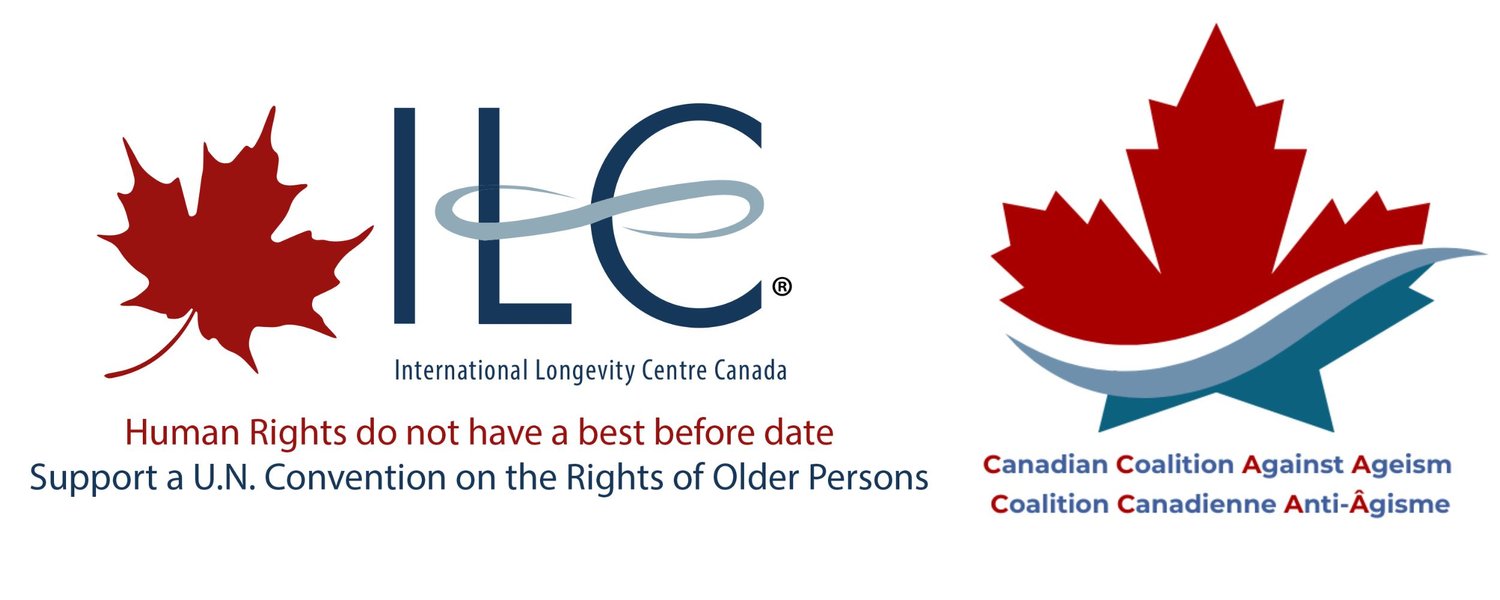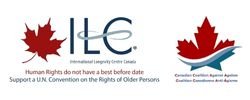The Canadian Coalition Against Ageism (CCAA) is a nation-wide social change movement to combat ageism against older people while protecting and strengthening their human rights.
Canadian Coalition Against Ageism
Your voice is needed!
Ask your elected officials to support the call for a UN Convention on the Rights of Older Persons. Join the Canadian Medical Association’s letter-writing campaign to Canadian elected officials. Register or log in to CMA Community, then click this link to access the letter-writing tool.
The campaign runs from April 29-May 20, 2024.
For support to log in or register, check out the FAQ.
Our Vision:
A Canada free of ageism against older persons
Background/Context:
The World Health Organization defines ageism as “the stereotypes (how we think), prejudice (how we feel) and discrimination (how we act) towards others or oneself based on age.” Globally, one in two people are ageist against older people. While other forms of discrimination such as racism and sexism are widely condemned, ageism disappointedly remains accepted and unchallenged in many situations. Ageist attitudes and beliefs held towards older persons, and the actions resulting from them, along with a general lack of social awareness of ageism, have negative health, social, societal, and economic impacts, many of which are outlined in the 2022 publication An Examination of the Social and Economic Impacts of Ageism.
Ageism is a complex and a pervasive social issue, taking many forms. Whether subtle or overt, the damaging effects are real and can have serious consequences, such as poor health outcomes, reduced longevity, abuse and neglect, financial insecurity, stigma, loss of confidence and self-esteem, and intergenerational conflict. For some older people, ageism intersects with the effects of disability, poverty, sexism and racism to compound these negative effects and increase marginalization and exclusion. Ageism violates human rights, and yet the laws, policies, structures, and practices to address these infractions are not applied, or do not exist. In fact, ageism is a barrier to the development of quality programs and policies that can apply a prevention lens to help safeguard against future harm. Political will and visionary leadership are required to bring about any significant social change regarding ageism.
Rationale:
The stereotyping and treatment of older people during the COVID-19 pandemic provided a stark wake-up call that society faces an urgent ethical, moral, and legal imperative to establish effective ways to address ageism and enhance and protect the human rights of older persons. More inclusive and equitable laws, policies, structures, and services are fundamental to eliminating ageism in healthcare, social services, workplaces, and media, and will also help to significantly reduce ageism in general – in businesses, communities, and families, as well as self-ageism.
The CCAA will forge a National Engagement Strategy of collaboration and communication aimed at creating a paradigm shift around age and aging narratives. This Pan-Canadian coalition of like-minded stakeholders will raise awareness of ageism and activate the adoption of laws, policies, and practices that support the human rights and social inclusion of older persons, ensuring this fast-growing demographic receives due profile and consideration. The CCAA will also engage Canadian NGOs to work toward achieving a UN convention on the rights of older persons.
Goals:
To reduce the impact of ageism against older people in Canada by:
positioning Canada as a nation that values the contributions of older persons in society
making Canada a world leader and partner in this movement for social change and global change efforts
engaging with diverse sectors, communities, and stakeholders to create a national movement to combat ageism and a paradigm shift around age and aging narratives
engaging policy and law makers’ participation and political commitment to eliminate ageism in Canada
engaging Canadians to support a United Nations convention on the rights of older persons, for creating a tool for a legally binding mechanism to ensure the protection, enforcement, and redress of human rights of older persons as well as promote awareness, education, and other activities to counter ageism.
Strategies:
Develop a comprehensive, coordinated National Campaign to combat ageism against older people
Anchor the campaign with WHO’s evidence-based interventions:
education across the lifespan
enhancing intergenerational relations to bridge the age-divide
influencing policy and legislation
Ensure all activities lead to strengthening, protecting, and promoting the human rights of older people
Ensure representation of older voices
Ensure an equity lens and representation of diverse communities
Building on what is already known to work
Support, cross-promote, amplify efforts of Coalition partners in strategic and intentional ways
Encourage Canadian NGOs to participate in the Open-Ended Working Group on Ageism (OEWGA) and work to promote the creation and implementation of a UN convention on the human rights of older persons
Objectives:
Through an Environmental Scan/mapping of Canadian NGOs, identify and engage coalition partners and other like-minded stakeholders to determine their current/ potential membership and resource contributions to CCAA and to build connections across Canada
Develop a comprehensive Communications Strategy and Plan that increases public awareness and understanding of the issue, engages media channels, effectively conveys stories and provides relatable examples for the general public, and uses an interactive website and social media channels to promote progress of CCAA’s work
Develop an Advocacy and Engagement Plan of Canadian NGOs to participate in Open-Ended Working Group on Ageism (OEWGA) working to promote the creation and implementation of a UN convention on the human rights of older persons
Create and disseminate tools, templates, and resources for engagement, education, and advocacy
Create an Evaluation Plan to measure progress of action plans and assess efficacy of activities
Secure in-kind, financial, human, IT, and other relevant Resources and Supports
CCAA Governing Principles:
Achieving the goals and objectives of the Coalition will take the collective efforts of many individuals and organizations, and clear and open communication among members will be vital to working together efficiently and effectively.
To create trust and confidence, build and maintain a positive reputation, and work ethically and effectively, the Coalition is committed to developing and implementing transparent processes, clear accountabilities, and defined decision-making processes.
Increasing the number and variety of members and partners will strengthen the Coalition by increasing awareness, amplifying voices, and broadening advocacy efforts. To ensure growth of the Coalition is not an impediment to efficiency and effectiveness, the structure will remain light and flexible, avoiding rigid or bureaucratic policies and practices.
CCAA is in a formative stage and will evolve as new members join, activities are implemented, new opportunities arise, and other such developments occur. Coalition members will understand and respect the iterative nature of this work and the different stages of development of the Coalition, its members, and its activities.
The purpose and goals of the Coalition are relevant to a broad range of individuals and organizations, including many whose voices and experience are often overlooked or excluded. Intentional attention to diversity and inclusion will help to ensure equity and develop more inclusive and appropriate messages and strategies that will improve Coalition efforts and effectiveness.
Coalition members bring a wide range of missions, activities, experience, skills, and perspectives that are relevant and valuable to this initiative. When speaking about Coalition purposes and activities, clear and consistent terminology and messaging will be essential to building the profile of the Coalition, ensuring clarity of its purpose and goals, and increasing awareness of the initiative.
Achieving the goals of the Coalition will require on-going investment of human and financial resources, and the sustained long-term efforts by many members. A commitment to sustainability; cost-effectiveness; short, medium; and long-term planning; and regular evaluation will contribute to the Coalition’s viability and vitality.
Our Partners:
The Global Alliance for the Rights of Older People:
Congratulations to Marta Hajek of the Canadian Network for the Prevention of Elder Abuse (CNPEA) on her election to the GAROP Steering Group.
See what people are saying about CCAA:
#AWorld4AllAges
United Kingdom launches Age Without Limits campaign joining existing campaigns in Australia and CCAA. See full story…
Let’s Take Action
CCAA was recently featured in the November 2023 issue of the SE Health Futurist Newsletter.
Resources:
To access additional resources about CCAA click here.






